The Bexley Selection Test (11+) guide

Thinking about a grammar school in Bexley, South London for your child? This guide walks you through how the system works, key dates for entry, and how to support your child through the Bexley Selection Test.
In this guide, you’ll find:
- How the Bexley grammar school system works
- Key dates and deadlines for 2027 entry
- Which schools use the Bexley Selection Test
- What your child will be tested on
- How the exam is scored and how places are allocated
- Practical ways to support your child’s test preparation
Which schools use the Bexley Selection Test?
There are four grammar schools in Bexley. They all use the same 11+ test. This is known as the Bexley Selection Test.
- Beths Grammar School
- Bexley Grammar School
- Chislehurst and Sidcup Grammar School
- Townley Grammar School
Dates for your diary
- Sunday 1st March 2026: Bexley Selection Test registration opens
- Tuesday 31st March 2026: Bexley Selection Test registration closes
- Monday 3rd August 2026: you will be able to view your child’s test centre date, time, and location online via the Bexley Selection Test webpage
- Between Wednesday 2nd and Thursday 10th September 2026: test dates for children sitting the exam at their Bexley primary school
- Between Monday 7th and Thursday 10th September 2026: test dates at the Bexley grammar schools
- Early October 2026: parents receive test results
- Saturday 31st October 2026: secondary school common application deadline
- Monday 1st March 2027: national school offers day
Dates can vary, so always check with your target schools.
What is the Bexley Selection Test?
The Bexley Selection Test is an academic exam taken by pupils in Year 6 each September. The test in September 2026 will be sat by children born between 1st September 2015 and 31st August 2016, who are due to start secondary school in September 2027.
It is used for admissions for Bexley grammar schools. If your child is at a Bexley primary school, they take it at their school. If not, they go to one of the grammar schools or an assigned site.
All four grammar schools in the borough use the Bexley Selection Test. This means that your child only needs to take the test once, even if they’re applying to two or more grammar schools in the borough.
If your child is also applying for a grammar school in Bromley, Kent or Medway, they will need to take a separate exam in addition to the Bexley Selection Test. Find out more information about these exams:
What's in the Bexley Selection Test?
The Bexley Selection Test is made up of two separate test papers, both taken in the same session. The test is administered by Quest Assessments and is designed to assess a child’s academic aptitude across a range of skills.
Both papers are timed, multiple choice, and divided into sections, with a set amount of time allocated to each section. Each paper lasts around 50 minutes, plus additional time for instructions and short practice questions.
Together, the two papers assess three key areas:
- Verbal ability and English comprehension, which assesses vocabulary, understanding written texts, and verbal reasoning skills
- Numerical reasoning, which focuses on mathematical problem-solving, using content no more advanced than what pupils are expected to have learned by the end of Year 5
- Non-verbal reasoning, which tests the ability to recognise patterns, understand relationships between shapes or objects, and apply logical thinking
An invigilator leads pupils through the test, clearly instructing them when to move on to the next section. All working out must be completed in the test booklet, as no separate rough paper is provided.
The full test session typically lasts from two and a half to three hours, including instructions, both test papers, short practice examples, and a brief break between the papers.
Is your child ready for the 11+?
See where they stand in minutes. Atom’s free 11+ baseline tests give you an instant breakdown of their strengths and gaps. Know exactly what to focus on next and start preparing with direction, not uncertainty.
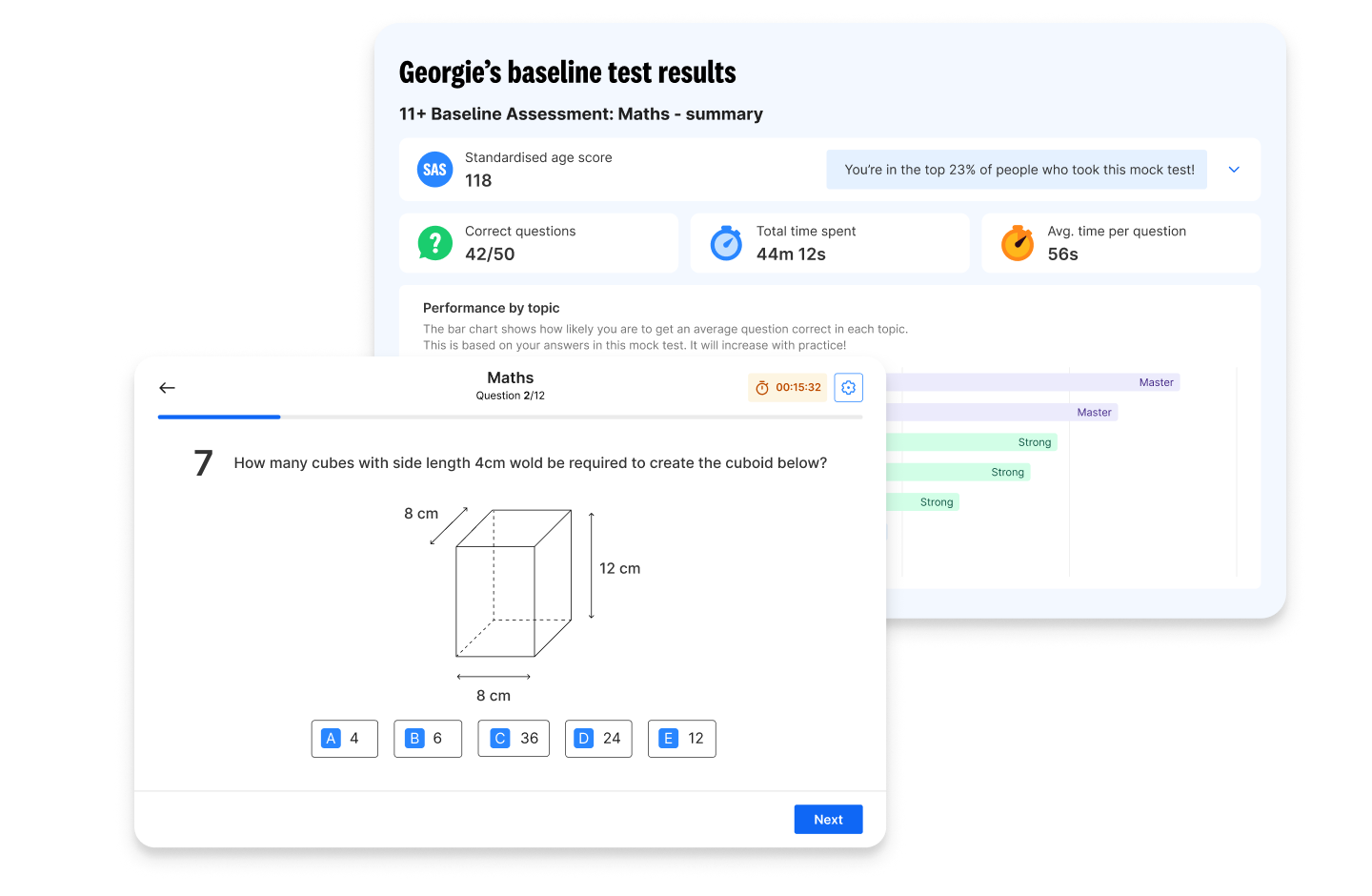
How is the Bexley Selection Test marked?
The Bexley Selection Test is marked externally, and parents are informed of their child’s total age-standardised score. This score is used to determine whether a child has met the selective standard.
The total score is a weighted, age-standardised score, made up of the following components:
- 50% from the verbal ability score
- 25% from the numerical ability score
- 25% from the non-verbal ability score
The average total weighted age-standardised score is 200, with approximately two-thirds of candidates achieving a score between 170 and 230.
What's the pass mark for the Bexley Selection Test?
There is no fixed pass mark for the Bexley Selection Test. Children are ranked based on their total age-standardised score, and each year the Council and the four grammar schools agree on the score needed to meet the selective standard.
More children are classed as selective than there are grammar school places available, so meeting the standard does not guarantee a place. The highest-scoring applicants are given priority, but places are ultimately offered using the school’s oversubscription criteria, such as home-to-school distance and sibling priority.
The test is competitive, with around 30% of children typically achieving a score high enough to be considered for a grammar school place.
Full admissions policies for each school are available on their respective websites.
How to apply to Bexley grammar schools
If you're considering a Bexley grammar school for your child, it's a good idea to speak to your child's teacher first. Once you're confident your child is working at the standard needed to keep up in a grammar environment, you will need to:
1. Register for the Bexley Selection Test
Registration for the test opens on the Bexley local authority website in March.
After you've registered your child, you'll receive a test invitation. This will tell you where and when your child is due to sit the test. This will either be at their primary school or at a testing centre.
If you are considering grammar schools outside Bexley, remember to register for their exams too.
2. Apply for school places
You will be sent your child's results in early October 2026.
You can use the results to decide which schools to include on your secondary school common application form.
Before listing a school on your form, check its admissions policy and make sure your child is eligible. The application form must be submitted to your home local council by 5pm on 31st October 2026.
3. National offers day
On Monday 1st March 2027, you will find out which school your child has been allocated a place at. They will be allocated a place at your highest-preferred school if they meet the entry criteria and if it has places available.
If your child was not allocated a place at your first-choice school, you have the right to appeal the decision. You should contact your child’s headteacher to discuss whether a review request can or should be made.
How can I help my child prepare for the Bexley Selection Test?
The Bexley Selection Test can feel like a big milestone, but preparation doesn’t have to be overwhelming. Here’s how you can help your child prepare for test day.
Stay on track with a clear Bexley Selection Test revision plan
One of the hardest parts of preparation is knowing what to focus on, when, and how to make steady progress without it taking over family life.
A clear, structured plan helps your child feel less overwhelmed and more in control. It ensures they build skills in the right order, cover everything they need, and avoid last-minute cramming.
Atom’s exam plan makes this easier. Enter your child’s target schools and exam dates, and we’ll create a personalised weekly plan tailored to the topics they’ll be tested on. It shows them what to work on and when, adapts as they improve, and helps them build progress in a calm, manageable way — little and often.
That means less guesswork for you, less stress for them, and a clearer path all the way to exam day.
Build exam technique with realistic practice papers
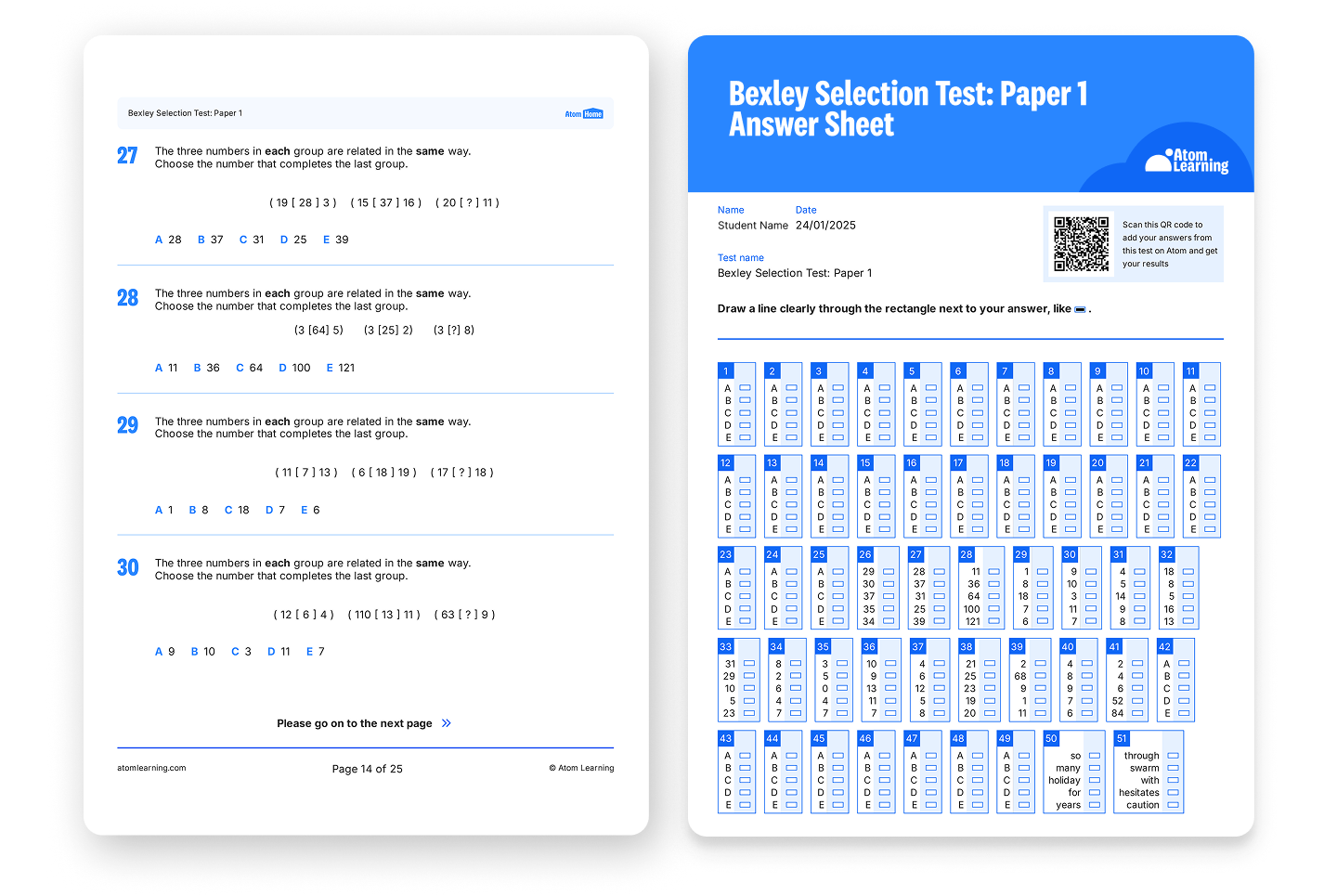
As your child’s knowledge grows, practice tests can help them feel more comfortable with the real exam format.
Atom’s 11+ practice papers are replicas of real 11+ exams. They’re also unlimited – you can download the same paper again and again, and your child will get new questions each time. This helps them practise without repeating the same content.
We’ve made marking easy for you, too. Simply photograph your child’s answer sheets and upload them to Atom. The papers are marked instantly, showing your child’s standardised age score (SAS), where they’re doing well, and what they should focus on next. You’ll also learn how they compare to other children applying to the same school.
Encourage regular reading
Strong reading skills play a big role in 11+ preparation.
Encourage your child to read every day, even for just 10–15 minutes. The key is variety. Mix fiction and non-fiction, different genres, and a range of authors. This helps them become more confident in understanding tone, purpose, and meaning across different texts.
Over time, regular reading will:
- broaden their vocabulary
- improve comprehension and inference
- build confidence in tackling unseen texts
And just as importantly, it can help them enjoy reading — not just see it as exam preparation.
Looking for inspiration? Atom’s recommended reading lists have suggestions spanning fiction and non-fiction for Years 3–6.
Celebrate progress, not just scores
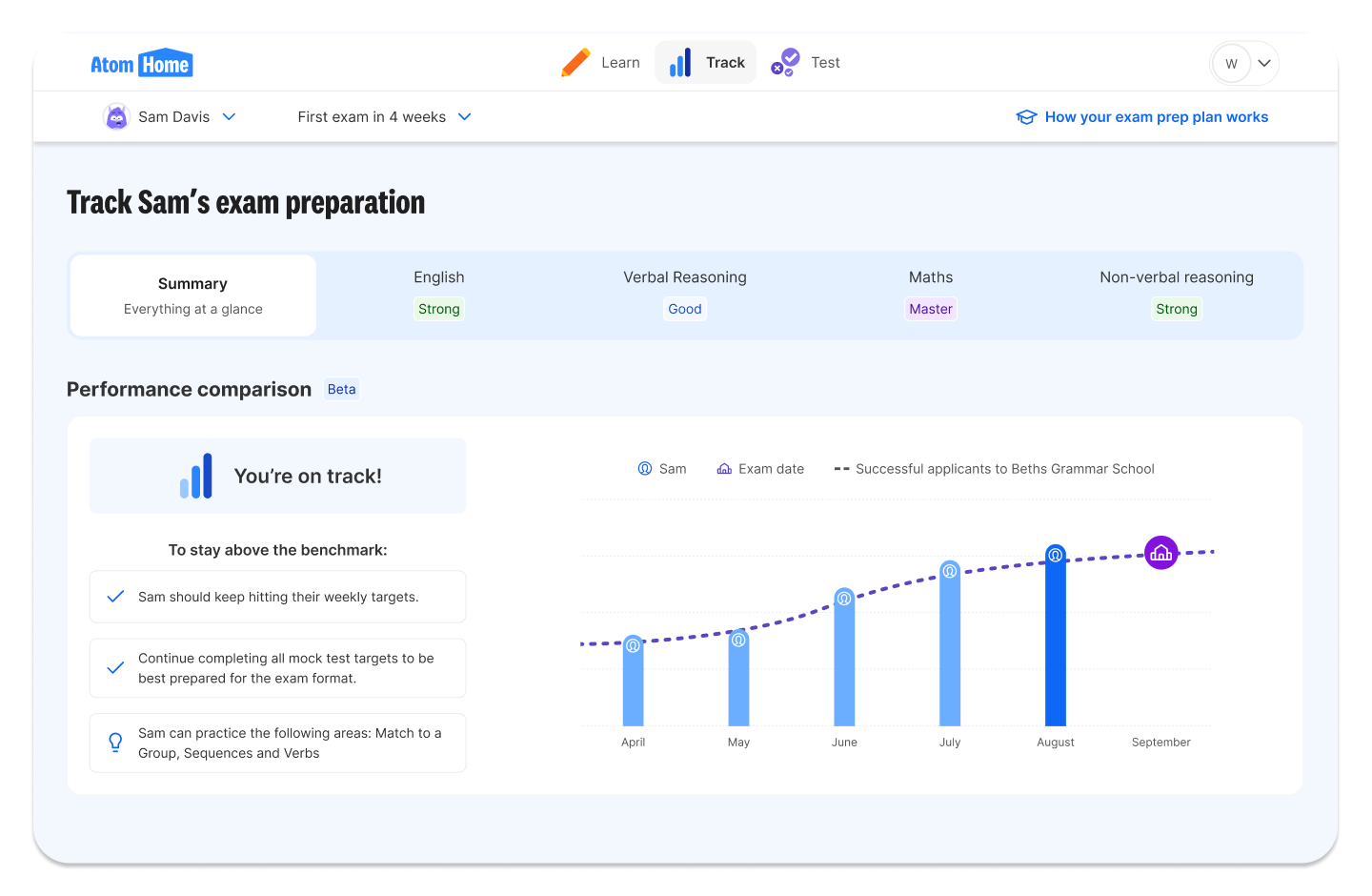
When you’re supporting your child through 11+ preparation, what really matters is knowing they’re moving in the right direction — not just how they scored on a single test.
Atom’s progress tracking gives you a clear, simple picture of how your child is doing in each topic and the direction they’re moving in. You can see where they’re on track, where they might need more practice, and spot progress as it happens.
That makes it easier to give meaningful encouragement, keep motivation steady, and focus on what matters most: consistent improvement, not just one-off results.
Take control of your child’s 11+ preparation.
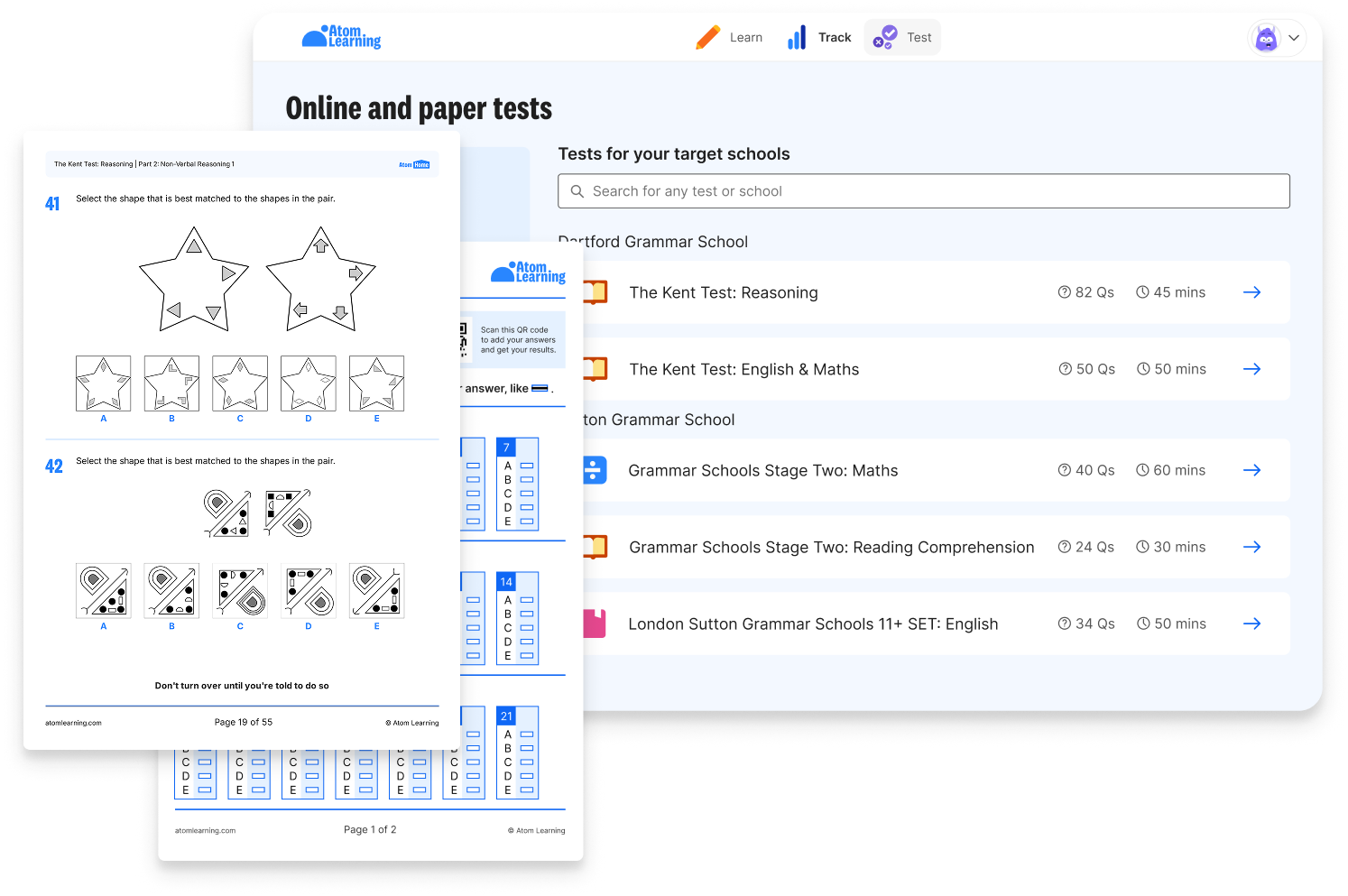
Not sure if your child is on track for the grammar school 11+? You don’t need to guess what to cover or whether they’re ready. Atom shows you exactly what to practise each week and how they’re performing, so you can stay ahead of the process without the stress.
- Follow personalised weekly exam plans that show them what to learn next.
- Download replica 11+ practice papers and upload a photo for instant, stress-free marking.
- Track progress and see how they compare to others applying to the same schools.
Start your free trial and help your child feel fully prepared for the 11+.

